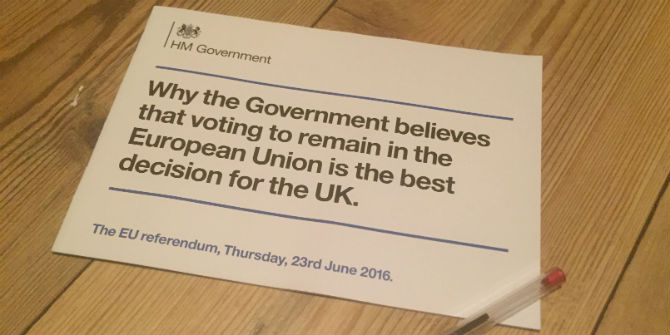 What are the prospects for limiting or reversing the influence of Brussels over UK labour market policy? And is this desirable or necessary? These questions were the focus of a lively but amicable debate as part of the third session of the LSE Commission on the Future of Britain in Europe, writes Steve Coulter. The broad conclusion of the discussion, involving business groups, trade unionists and policy analysts, was that UK and EU labour market policies and practices are now so intertwined that it would be extremely difficult for the UK to extract itself from the ambit of EU Single Market regulation – even in the event of withdrawal from the EU, or a ‘Brexit’.
What are the prospects for limiting or reversing the influence of Brussels over UK labour market policy? And is this desirable or necessary? These questions were the focus of a lively but amicable debate as part of the third session of the LSE Commission on the Future of Britain in Europe, writes Steve Coulter. The broad conclusion of the discussion, involving business groups, trade unionists and policy analysts, was that UK and EU labour market policies and practices are now so intertwined that it would be extremely difficult for the UK to extract itself from the ambit of EU Single Market regulation – even in the event of withdrawal from the EU, or a ‘Brexit’.
One of the key arguments deployed by Eurosceptics against UK membership of the EU has for a long time rested on the charge that the regulatory burden imposed on businesses by Brussels has sapped competitiveness and costs jobs. Many employers – even those who, on balance, believe EU membership is beneficial – complain in particular about the impact of EU-inspired employment regulations. The Working Time Directive, Temporary Agency Workers Directive and Acquired Rights Directive are singled out by firms as being particularly unwelcome. One estimate, by the think tank Open Europe, puts the annual cost of employment regulations, 70% of which are inspired by Brussels, at £8.6bn.
Before David Cameron unveiled his renegotiation strategy to Donald Tusk on 10 November 2015, the signs were that rolling back EU employment regulations would therefore be a key demand of his government. However, this policy area was dropped from the final set of initiatives, possibly in the face of opposition from trade unions whom the government needs to keep on board for a pro-EU campaign. This means that the only prospect of significantly reforming employment policy in the immediate future now rests with a Brexit.
Yet, most UK businesses don’t want a Brexit, even if this theoretically allowed the UK a free hand to scrap or modify EU employment legislation, or at least to shift the regulatory regime in a direction arguably more compatible with the UK’s flexible, service-oriented economy and labour market. Surveys of firms by the Confederation of British Industry show consistently strong, albeit qualified, support for EU membership. Even the more Eurosceptic Institute of Directors, representing bosses of many smaller firms who are less likely to benefit from access to the single market yet still have to implement EU regulations, remains in favour of membership.
This is not to say that EU involvement in the employment policies of member states is uncontroversial or that there is no remaining pressure for reform. While most businesses accept that some regulation enforcing common standards is necessary to make the single market work and prevent ‘social dumping’, they take issue with both the process by which policy is devised and the manner in which it is enacted. The European Commission, it is alleged, often makes bad decisions through a lack of consultation with those affected by its actions; meanwhile, the ‘activism’ of the European Court of Justice produces too many judgments that extend the scope of legislation far beyond the original intention of those drafting it.
 Photo under the Creative Commons Attribution-Share Alike 3.0 Unported license.
Photo under the Creative Commons Attribution-Share Alike 3.0 Unported license.
Underlying these complaints is a feeling among many business groups that the regime of civil law prevalent on the continent clashes with the UK’s common law tradition, encouraging UK legislators to ‘gold plate’ EU policies in order to avoid any ambiguity over their implementation. Put simply, the UK’s individualistic, company-based industrial relations system is fundamentally different from the collectivist regimes in many European countries which is reflected in the institutionalised involvement of ‘social partners’ in Brussels.
Trade unions, while acknowledging the imperfections of the EU policymaking system, remain in favour of more labour market regulation, particularly in the fields of health and safety and equal treatment of workers. Unions see Brussels as still the best route to achieving this, given the lack of direct access they enjoy to policymakers in the UK. One consequence of the individualisation of employment relations in the UK since the decollectivization of labour markets in the 1980s, they argue, is greater recourse to lawyers to settle disputes, complicating the business of regulating employment relations. A revival of social dialogue between employers and their workers’ representatives would make it much easier to implement, negotiate and modify employment regulation.
More generally, businesses’ complaints about the burden of regulation treat employees only as a cost, ignoring the potential for employment policies providing greater rights at work to enhance human capital and raise productivity. Unions point to OECD data indicating no reliable link between levels of employment regulation and unemployment and note that the UK already has one of the least regulated labour markets in the EU.
While the danger remains that the UK and a few other countries could find themselves isolated outside a dominant bloc of Eurozone members dictating future policy under Qualified Majority Voting rules, both sides in the debate noted that labour market policy is increasingly developed under the purview of the Community method, permitting countries some flexibility to regulate at their own pace.
They also agreed on one fundamental thing: EU employment regulation is now so deeply embedded in UK case law that any attempt to unpick it in its entirety would be lengthy, costly and difficult. It was left to the Law Society’s Mark Paulson, of all people, to point out that ‘Brexit would be a bonanza for the lawyers’.
This blog represents the views of the author and not those of BrexitVote, nor the LSE.
Dr Steve Coulter is LSE Fellow in the Political Economy of Europe at the European Institute, LSE. He publishes on industrial and growth policies in Europe and the politics of labour market reform. He is the author of ‘New Labour Policy, Industrial relations and the Trade Unions’ (Palgrave 2014).






